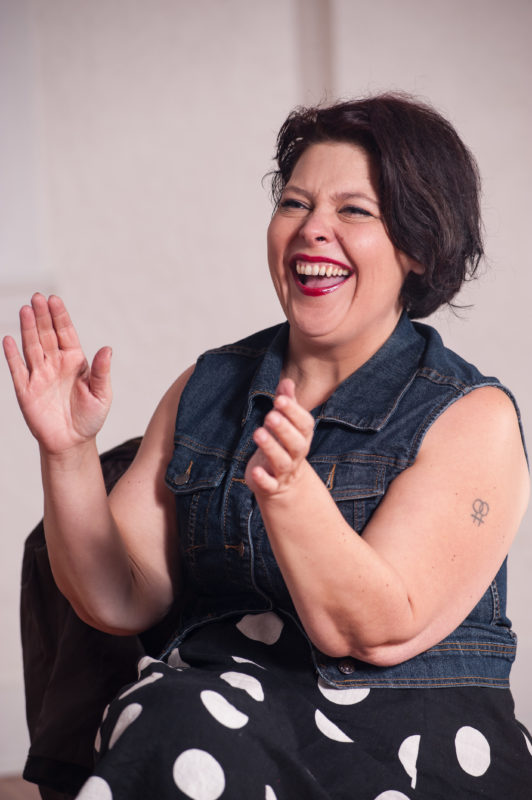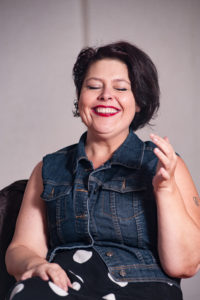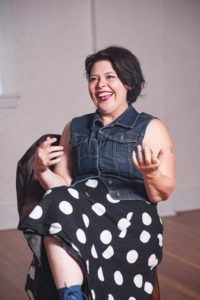 The seventh iconic woman featured in the This Woman portrait and interview series is Portland Queer Comedy Festival founder Belinda Carroll. This Girl Laughs, This Girl Cries, This Girl Does Nothing co-producer and actor Beth Thompson recently spent some time with Belinda, talking open mics, being a voice for the voiceless, and things your grandmother might not be comfortable with.
The seventh iconic woman featured in the This Woman portrait and interview series is Portland Queer Comedy Festival founder Belinda Carroll. This Girl Laughs, This Girl Cries, This Girl Does Nothing co-producer and actor Beth Thompson recently spent some time with Belinda, talking open mics, being a voice for the voiceless, and things your grandmother might not be comfortable with.
Photos by Lava Alapai
Compassionate, bawdy and bright, Belinda Carroll is a treasure in Portland. A producer as well as an active comedian, she is co-founder of the Portland Queer Comedy Festival. Her path into this position of leadership is a winding and fascinating journey, and I am only going to begin to touch on it. Just a heads up, our conversation includes the kind of bawdy language that I’m comfortable with, but your grandmother might not be.
As with all of these wonderful women, I started by wanting to know the inspiration and trajectory behind the leadership work they now do.
Belinda says, “There is always a trajectory, because in comedy you have to be so dedicated to it, so there has to be a pervading reason for you to do it. I did music for a long time and at one point I was fired from this band. This is in Texas and they were older, we were a jazz funk trio, right? And they were mad at me because I didn’t change the pronouns of my songs to male pronouns. They were pissed off about that.”
“And, we went to a couple of gigs and the audience that started showing up was heavily lesbian and so, they fired me from the band. Because they wanted a pretty girl to sing and just be, you know, mainstream pretty girl. So that was my breaking point. I felt like, ‘I am not going to be in an industry that I have to pretend like I’m something I’m not.’”
 “At the same time that happened, the beginning of the nightmare: Sarah Palin was nominated Vice President. You know, the golden years. Who knew that wasn’t the apocalypse? So, I ended up being pissed and writing a bunch of jokes. And I went down to the open mic at Cap City Comedy one night and nobody knew about it. I brought my girlfriend at the time. When we left my girlfriend was like, “How do you think it went?” And, I was like, “Well, I think my set ups need to be shorter and…” And, she was like, “Oh, you’re totally doing this again.”
“At the same time that happened, the beginning of the nightmare: Sarah Palin was nominated Vice President. You know, the golden years. Who knew that wasn’t the apocalypse? So, I ended up being pissed and writing a bunch of jokes. And I went down to the open mic at Cap City Comedy one night and nobody knew about it. I brought my girlfriend at the time. When we left my girlfriend was like, “How do you think it went?” And, I was like, “Well, I think my set ups need to be shorter and…” And, she was like, “Oh, you’re totally doing this again.”
But, nobody knew about it and I decided I was never going to do an open mic again because, it’s terrifying. It is terrifying. But Cap City records its open mic to put on Roof Top Comedy and so it ended up online, my very first set. And, my friend and fellow comedian Holly Lorka messaged me on MySpace, “Girl, did you just do comedy?” And, I said, ‘I did.’ (She said,) ‘No way! You have to do it now.’
“Then in 2009, I was hired by Holly to do our first gay show at the Rusty Spur in Austin. We packed the place out and that was the beginning of that. Because I realized not only can I do this, but I can also develop this gay following. Which is all I ever wanted, you know? So that’s where the Queer Comedy Festival comes from – because I started producing these gay shows and found there is a huge need for this.”
“I feel like one of my jobs, and I think this is the job of a lot of non-mainstream comedians who are either POC or queer, is that you’re the voice for the voiceless. That’s really the jam. There is a prevailing need for those voices, and the thing is that a lot of the population is in a situation where they can’t speak out for whatever reason. They’re in the south or they have a family who doesn’t accept them. So, the people that can speak out must. Comedy is a way to insert your rebellious progressive ideas on people in a way that makes them laugh and then hopefully makes them think too… but makes them laugh.”
“So, they can kind of separate the facts from the judgement because of course there is confirmation bias, right? You have a situation where you have people that believe one thing and the reason they believe that one thing is because they were told that when they were seven and then they just believed. And when you foist a new idea upon someone, they’re defensive about it. ‘This is what I’ve known my whole life so if it’s not true, what do I have to believe in?’ So, the way that comedy works for me and, the higher ideal of comedy is to be able to introduce those ideas in a way that is non-threatening to people. So you’re inserting those ideas in a way they can accept and hopefully they can think from there. Does it work? No. (laughs)”
“I mean, there is something about the function of laughter that opens people up. You know, the Vagus Nerve is opened up when you laugh or when you sing. And the Vagus Nerve has a direct correlation to the way we process emotion. So, yes, there is a physiological reaction within laughter is literally healing, on a physiological level healing.”
I love that. I am often overwhelmed by the effects of laughing and singing with other people. And, by the fact that simply observing other people laugh and sing can open a human up to an emotional experience that may otherwise be unavailable to them. And, the truth of the matter is that once someone is fixed in an idea, science and facts are often overwhelmed by confirmation bias. But, that tricky little manipulator Feeling can be an effective way to open up a stubborn perspective. And laughter and song, as bawdy as they may be, have a Vagus Nerve Backdoor to inspire people to connect with their feelings.
I tried to begin at the beginning with Belinda, but it seems we ended up going back in time as our conversation progressed. Right away she started speaking with me about her mom, who passed away in 2005. It was a foundational and transformational relationship. And, so much of what Belinda is working to fight in this world she discovered early on in seeing the way her mother was limited by her economic position and her gender.
“My mom had a background where she was the daughter of West Virginia coal miners. She grew up with no electricity, on land that we barely owned, and my granddad was a coal miner. She moved west in 1963. She had no concept of feminism. And, then she raised me and I came out when I was 15. And, when I came out like the whole of idea of feminism was foreign to her and she was 55 because she had me at 40. And, so she was 55 and she was dealing with me as a child. And, I was an activist since I was 16-17 years old. And, so she has this daughter who is like, ‘No. I’m a feminist. And, I’m a queer activist. ‘ Well, we didn’t use queer back then. ‘But I’m a lesbian activist.’”
But, Mom didn’t accept Belinda’s sexuality at the outset and Belinda ended up moving out and living on the streets for a year and a half.
“I didn’t talk to my mother, I didn’t do anything. I just couch surfed and lived on the streets. I was 17-18. Then I came back after a year and a half. I just showed up at her house one day. She was apologetic and had a lot of time to think and then we became better friends and started talking like adults toward each other. And when that happened, then she started clueing in. She started getting to know my friends. She had pushed away queerness so hard and just pushed away the idea that her daughter wasn’t just going to marry some guy with a good job and be a mom. Because that was her whole jam my entire life, ‘You should see how men look at you. You could totally get a rich husband. You could be taken care of, you wouldn’t have to worry about anything. You could just be this wife and have kids. You love kids, it wouldn’t be the worst life. You could have kids and be taken care of.’ I was literally taught that.”
“So when I came back and she started getting to know my friends. And, one day she looks at me and she says, ‘Okay. So this is what I don’t understand. Everybody in the Christian world is telling me that you’re wrong. But, your brother Joe is doing this thing, your brother Ben’s doing this thing, your brother Jeff is doing this thing, Pastor Bill is doing this thing. The only thing you do is fuck women.’ She literally put it like that. And I was like, ‘Whoa.’ ‘That’s the thing. I see you and you’re truthful, you’re good. And this is the only ‘wrong’ thing, so who’s wrong here.’”
“So that was her breakthrough and after that she started joking around. She started to  integrate into queer coding and life and stuff. She got along really well with my girlfriends and she tried. I watched her go from this really rigid, evangelical Christian with these very firm beliefs in what was sin and what wasn’t sin. Until one time she said, ‘I don’t understand you girls. You go on and on about feminism and then you wear dog collars around your neck!’ (laughs) She really got down with it. I think I got her to read a Gloria Steinem book once.”
integrate into queer coding and life and stuff. She got along really well with my girlfriends and she tried. I watched her go from this really rigid, evangelical Christian with these very firm beliefs in what was sin and what wasn’t sin. Until one time she said, ‘I don’t understand you girls. You go on and on about feminism and then you wear dog collars around your neck!’ (laughs) She really got down with it. I think I got her to read a Gloria Steinem book once.”
I don’t think she ever completely…I think if she had been born at a different time or had been introduced to feminism principles earlier, then it would have been different. She had a baby in 1956 in West Virginia at 20. And then she moved west with her husband and she was just trapped in laundry jobs and line cook jobs. And then my dad left. And there was no opportunity for a woman from Cookie Creek, West Virginia in Portland, OR who has a 6th grade education who grew up on a farm. That’s the pervading, driving principle of my entire activist career. It’s because I’m not going to be that.”
“I was just telling a dude last night who was, like, 22 or whatever. (laughter) We were talking about queer history about how women couldn’t be in relationships pre-feminism because they weren’t allowed to have a bank account together. They weren’t allowed to own property together. They weren’t allowed to own their own bank account. They had to have their husband as a co-signer. If you weren’t a married woman you had almost no rights in this country until 1965. It’s insane and people don’t even realize that. They’re like, ‘Women have come so far since feminism!’ I’m like, ‘Do you understand where we were before feminism? Do you understand what we’ve done in 50 fucking years?’ Because 50 years ago you weren’t allowed to lease a property, to own a property. And, if your husband just plain ass wanted to take all your money, he could.”
“Once my dad opened a bank account and a credit card. This was the beginning of credit cards. It was a Sears card. In 1972, my dad opened this Sears card without my mom knowing about it because he was allowed to because he was her husband. And he charged five grand in 1971 dollars on this Sears card with my mom not even knowing about it at all, and then she just got a bill that she owed five thousand dollars to Sears. And he did it because they were about to get divorced. So he left for awhile and cleared out the bank accounts and came back and then what choice does she have? She’s like well, ‘I guess I’m stuck in this relationship now. Because I’m not allowed to have property or rights and I’ve got three fucking kids.’”
And, this is the history (or rather, the smallest slice of a history) of the kind of betrayal that systematic sexism has thrown down on women’s bodies for centuries. And,of the way those betrayals propels and define the beginning of a woman’s path. Betrayal is the instigating moment in This Girl Laughs when the sisters have to define their independent directions. Betrayal and loss are so often the instigating forces behind growth and change, but the nature of a broken system means not everybody is able to recover from those hits. I’m really grateful to Belinda for taking the path on with joy, passion, caring and comedy.
Check Belinda out and share the path with her every 4th Sunday with SMUT at Funhouse Lounge. And, don’t miss this summer’s 2nd Annual Portland Queer Comedy Festival July 19-22nd. You can keep up with Belinda on Twitter (@BelindaComedy) and Instagram (@belindacomedy). You can also purchase your tickets for This Girl Laughs, This Girl Cries, This Girl Does Nothing here!




